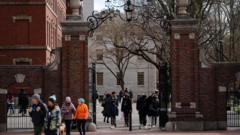The repatriation of the Americans follows an attempted coup and potential U.S.-Congo mineral agreements.
Congo Sends Three Americans Home After Death Sentences Commuted

Congo Sends Three Americans Home After Death Sentences Commuted
Three U.S. citizens, previously sentenced to death, repatriated after clemency amid coup attempt fallout in the DRC.
April 9, 2025, 8:45 a.m. ET—Three American citizens, Benjamin Zalman-Polun, Marcel Malanga, and Tyler Thompson, who had faced death sentences for their involvement in a failed coup in the Democratic Republic of Congo (DRC) last May, were returned to the United States on Tuesday. The Congolese presidency announced the clemency granted to the trio, commuting their sentences to life imprisonment. The repatriation comes just days after U.S. officials met with Congolese President Felix Tshisekedi, who is seeking U.S. partnership in the country’s vast mineral resources amidst conflict-driven instability in the eastern regions of Congo.
The three men were among 37 individuals sentenced following a violent attack on the government, which included clashes near the presidential palace. Congolese representative Tina Salama shared photos of the men as they boarded a plane, now en route to serve their sentences in the U.S. State Department spokeswoman Tammy Bruce confirmed this transfer, but the Justice Department has not disclosed details on their imprisonment location or conditions.
This development arises amid efforts by Tshisekedi's government to stabilize its hold over territories plagued by armed insurgencies, notably the M23 group this has been associated with Rwanda. U.S. officials, including Trump's adviser for Africa, Massad Boulos, hinted at potential collaborations concerning DRC’s extensive mineral resources, critical for renewable energy technologies.
The initial coup attempt was marked by a gunfight resulting in the death of the coup leader, Christian Malanga, a minor opposition figure and father to Marcel Malanga, who claims he was coerced into participating during a visit. DRC authorities highlighted the successful thwarting of the coup, which briefly saw armed men occupy a presidential office. The events surrounding the coup and the subsequent responses might reshape U.S.-Congo relations, particularly with mineral extraction agreements that have drawn the interest of both nations.
The three men were among 37 individuals sentenced following a violent attack on the government, which included clashes near the presidential palace. Congolese representative Tina Salama shared photos of the men as they boarded a plane, now en route to serve their sentences in the U.S. State Department spokeswoman Tammy Bruce confirmed this transfer, but the Justice Department has not disclosed details on their imprisonment location or conditions.
This development arises amid efforts by Tshisekedi's government to stabilize its hold over territories plagued by armed insurgencies, notably the M23 group this has been associated with Rwanda. U.S. officials, including Trump's adviser for Africa, Massad Boulos, hinted at potential collaborations concerning DRC’s extensive mineral resources, critical for renewable energy technologies.
The initial coup attempt was marked by a gunfight resulting in the death of the coup leader, Christian Malanga, a minor opposition figure and father to Marcel Malanga, who claims he was coerced into participating during a visit. DRC authorities highlighted the successful thwarting of the coup, which briefly saw armed men occupy a presidential office. The events surrounding the coup and the subsequent responses might reshape U.S.-Congo relations, particularly with mineral extraction agreements that have drawn the interest of both nations.





















